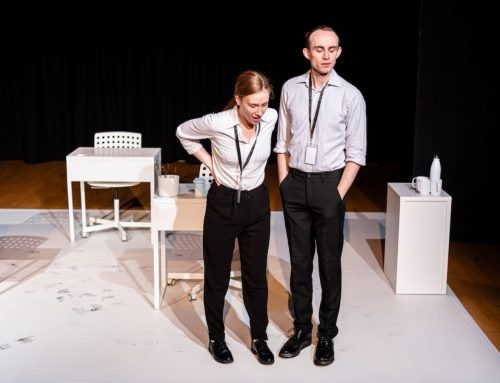Sometime in the next 100 years the Welsh seaside village of Fairbourne will be submerged underwater, a victim of the rising seas caused by the climate crisis. Plans are already in place to relocate residents and dismantle sewers, gas pipes, electricity pylons and hundreds of buildings. In time, the area will revert to being a tidal salt marsh. It is a dystopian process of managed retreat certain to be repeated in thousands of coastal towns across the world. Writer Molly Anne Sweeney sets her bleak, brooding, two-hander Decommissioned in a fictional Fairbourne and asks how, in the face of impending doom, can we manage fear and move on with our lives?
School-teacher Ellis (Aled Thomas Davies in perfectly observed teacher mode) opens Decommissioned delivering a class to 10-year-olds on what to do in a flood. “Be Prepared” and “Go Somewhere higher” gets a thumbs-up. “Play on the beach” gets a definite thumbs-down. Ellis is trying to be as “sensible, supportive and grown-up” with the kids as he can, but one in particular, Jackson, is tearful and all-consumed by fear. “It’s attention-seeking behaviour” observes the not entirely sympathetic Ellis. The educator’s on-off girlfriend Gwen (an excellent Marina Johnson) is an expert in climate change policy, but she too is scared stiff at what the future holds. The developing, often rocky relationships between dorky, small-town Ellis, glum Gwen, and the unseen Jackson provide the central driving force of the play.
Sweeney covers much familiar climate crisis territory here and is direct in reminding her audience of how individual failure to act now is certain to make a bad future worse. But she never berates or confronts. This is more a sober invitation to reflect on the challenges we share in reckoning with the future. The solution she proposes is a mind-frame that eschews both deliberate self-deception and collapsing into impotent gloom. “Will we be, OK?” Ellis asks at the close of Decommissioned. “We’ll have to be” is Gwen’s response. It is a message that is realistic, if not exactly optimistic.
There is a gentle melancholy to Sweeney’s writing that is absorbing, if sporadically a tad slow. Not much happens and the characters do not develop hugely. But they are immediately recognisable and, in their determination to find a way to move forward, invite a kind of stoic empathy. The atmosphere is aided by a suitably gloomy and foreboding soundscape from designer James Ireland: ceaseless beating rain, tempestuous seas, and flooding rivers.
Writer: Molly Anne Sweeney
Director: Sofia Bagge
More Recent Reviews
Too Many Books. Upstairs At The Gatehouse.
Renowned writer-director Mike Leigh, whose works are often rooted in the intricacies of social rank and identity, once proposed [...]
Remember Me. Ye Old Rose and Crown Theatre.
Most days, 14-year-old Stephy goes from school to visit her much-loved “Nana Penny” at the Sunnyside retirement home. The [...]
TRASH! Peacock Theatre.
Can it really be three decades since global mega hit Stomp, then in a production at Sadler’s Wells, garnered two [...]






